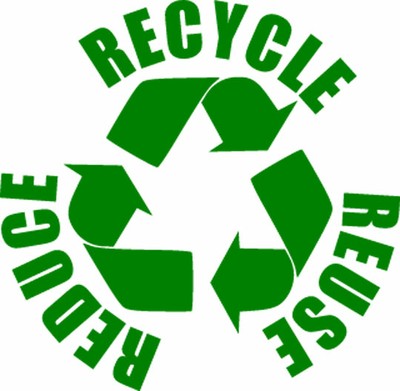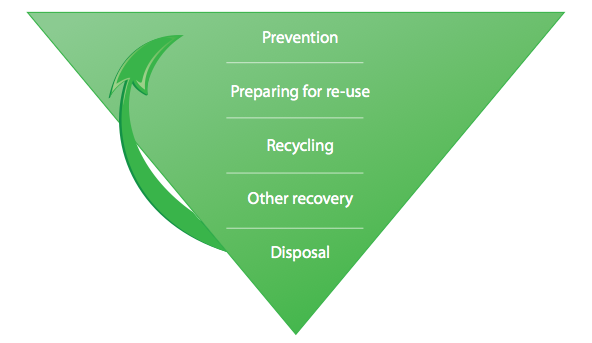Reduce, Reuse, Recycle. We’ve been hearing it all our lives. I’m sure we’re all familiar with the below symbol:

But what many people don’t realise is that this is actually a hierarchy. It’s Reduce, then Reuse, then Recycle. For example, let’s say you see a jar of jam on a shop shelf. You’re first thought should be, “Do I really need this jam?” This is a great question to ask yourself, and not only for environmental concerns. We live in a culture of overconsumption; a capitalist, consumerist cesspool of unnecessary goods and services. Sorry to go all Britta Perry on you, but you really should ask yourself if you truly need something before you buy it.
OK, getting back on track. If you decide that you really need the jar of jam, the next best thing to do is reuse the glass jar after you’ve finished the jam. Tea mug, pencil holder, plant pot; there are a multiplicity of ways to reuse the jar (and items in general, just Google it, there are so many fun, creative ways to reuse things). If you can’t find a decent use for the jar, the absolute last thing to do is recycle it. We get so focused on the recycle part, we sometimes forget that it’s actually at the bottom of the pyramid.
Or is it? It turns out that the 3R’s are just a simplified version of the Waste Hierarchy, a framework developed by the European Union for their Waste Framework Directive.

Prevention is similar to Reduce, as is Prep for Re-use and Reuse, and obviously Recycling is the same in both cases. Other Recovery is the last resort prior to disposal and generally refers to energy recovery, that is using various processes to turn the waste into heat, electricity, or fuel, AKA waste-to-energy.
The other difference between the 3R’s and the Waste Hierarchy is their target audience. The 3R’s are targeted at consumers and show what actions an individual can take, while the Waste Hierarchy dictates what society should be doing as a collective whole. I think it’s great that the EU developed a framework to guide waste management in the entire continent and, because it is a directive, all member states of the EU must use the framework to develop waste management and waste prevention programmes. We’ve talked in class about how slow organisations are to implement sustainability initiatives so YAY for mandatory compliance!
Thanks for this Raman. It’s so interesting how the 3R’s mantra has been heavily ingrained into my mind for as long as I can remember, but its true hierarchical nature never hit me. As westerners, we put Recycle on a pedestal. Maybe it’s because we’re good at it; or perhaps we’d just rather not have our consumption levels put in question. In any case, I think our simplified 3R’s system needs a heavier weight placed on reduction. Mandatory compliance seems to work well in implementation phases – the 2015 Organics Ban in Vancouver will generate big wins – and we’re certainly not going to Reduce without a little (read: “massive”) push.
Hey Raman. I think it’s interesting that people do not realize the hierarchy behind the 3Rs and when we think of that logo most people only think of recycling aspect of it. But as humans it is hard for us to reduce our consumption habits. I think that mandatory compliance is necessary right now but it is always difficult for governments to implement these policies because they want to be re-elected. For consumers they ultimately look for convenience (one of the 4Cs of sustainable marketing) and therefore many consumers would not have any reason to be sustainable without compliance.
Hi Ramen, Thanks for your post, this is quite interesting for me. Actually i didn’t know 3Rs is a hierarchy until reading your post. But i am also wondering why people like me have this misunderstanding? i think one of the reasons is that, as you mentioned, we live in a capitalist society, if we reduce our consumption then enterprises can’t make enough money, or like fast fashion brands, they couldn’t survive in the market if their consumers reduce their consumption. As a result, it is a little bit hard to constrain consumer’s consumption. So i think mandatory compliance is necessary as well. But by what mean is another issue.
Hey Raman!
Great blog post about your take on the 3 R’s! Like many others out there, I’m shopaholic and I often don’t think if I REALLY need the item or not, I just like it and buy it (horrible, I know). The fact that the hierarchy seems so obvious, yet the vast number of people that aren’t able to realize this is astonishing. Our society seems to push the word “recycling” into our minds way too much and because of that, when someone were to ask you how green are you? Many would probably say “I recycle”, and forget that there is so much more before that.
Thanks!
Katie
Hi Raman!
You definitely touched an interesting point that I haven’t though of. Recycling has always been the priority between the 3R’s and I didn’t focus much about the reduce or reuse aspects of it. Especially now that we are living in the era of massive consumption, “do I really need this?” is a very important question that everybody should ask themselves. The companies don’t make it any easier for you either. The phones, laptops or pretty much anything we purchase is not meant to last, and that is the biggest cause of waste. Well, I was just done with a jar of pasta sauce, and I will definitely look for alternative ways of using that jar instead of recycling it.
Thanks
Burak